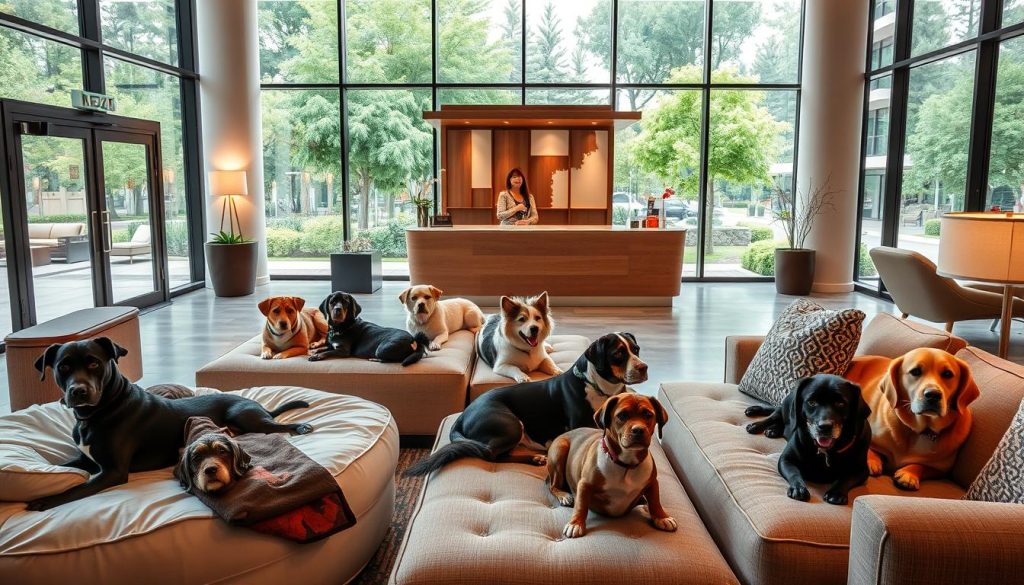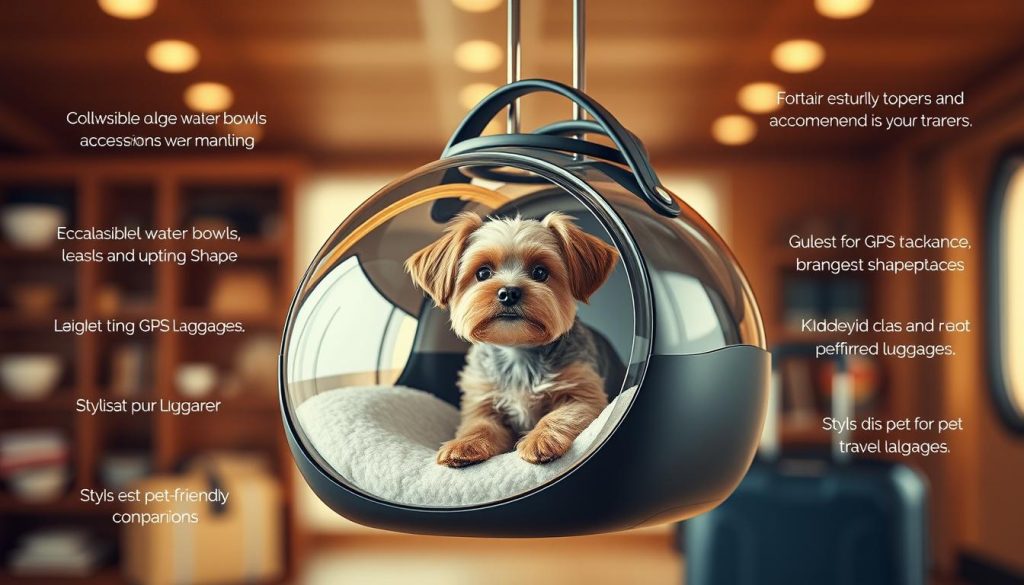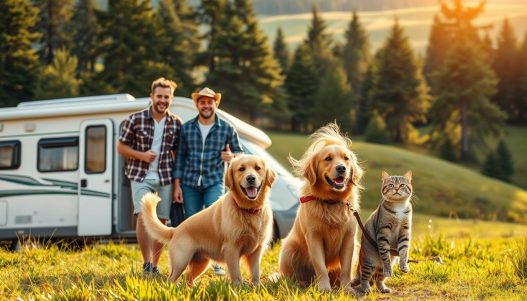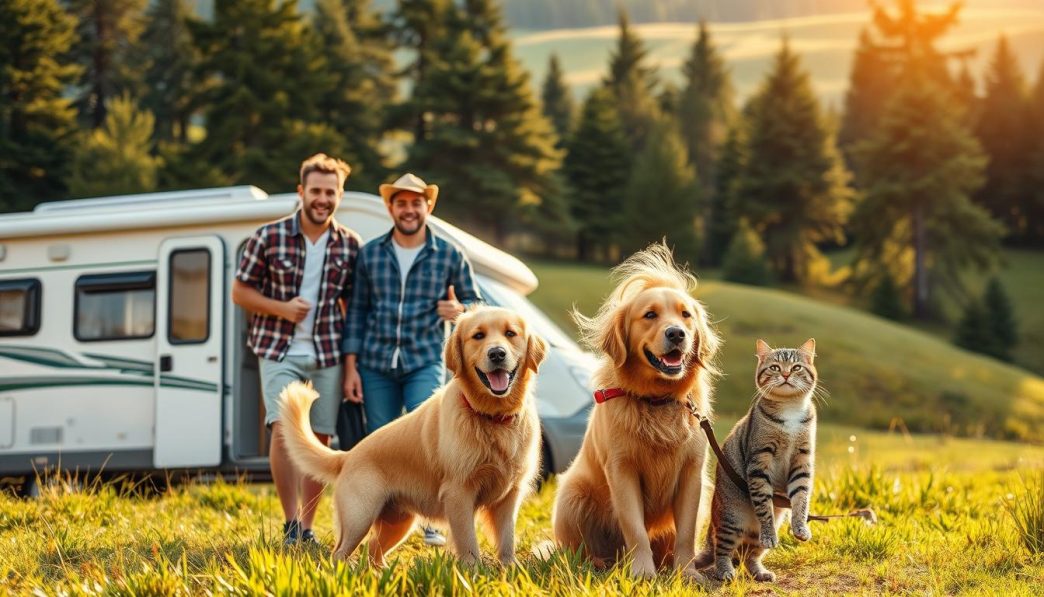More Americans than ever are choosing to bring their four-legged family members on trips. Recent surveys show over three-quarters of animal caregivers take their companions on journeys annually. This shift goes beyond occasional outings – it reflects a cultural transformation in how people view their relationships with animals.
The tourism sector has responded with creative solutions. Hotels now offer specialized amenities, while airlines introduce pet-friendly policies. Destinations compete to attract visitors by highlighting animal-welcoming features. These changes create opportunities for businesses and travelers alike.
Economic forecasts reveal staggering growth in services catering to adventurers with animals. This expansion impacts multiple industries, from hospitality to transportation. What began as a niche preference has become a driving force in vacation planning.
Younger generations lead this movement, prioritizing shared experiences with their animals. Over half of travelers under 40 regularly include their companions. This preference influences everything from accommodation choices to activity selection.
Key Takeaways
- Over 75% of animal caregivers incorporate their companions into annual travel plans
- Tourism providers increasingly adapt services to accommodate four-legged visitors
- Specialized travel services market expected to surpass $3.7 billion within six years
- Young travelers are twice as likely to prioritize animal-inclusive trips
- Destination marketing now emphasizes pet accessibility as key differentiator
- Shared experiences with animals redefine traditional family vacation concepts
Overview of the Millennial Pet Travel Revolution: 38% Now Vacation with Their Furry Friends
Recent surveys reveal 70% of American households include at least one animal companion, sparking a seismic shift in vacation planning. This cultural change goes beyond ownership – it’s reshaping entire industries as families prioritize inclusive getaways.
Emerging Travel Trends and Influencing Factors
The pandemic accelerated a 20% rise in animal adoptions, creating a wave of caregivers determined to share adventures with their companions. Remote work flexibility plays a crucial role, enabling longer trips without kennel concerns. “People aren’t just taking their animals along – they’re building itineraries around them,” notes a travel industry analyst.
Social media fuels this movement, with 54% of travelers under 40 sharing trip photos featuring their companions. Economic priorities also drive decisions – many younger adults allocate vacation budgets to animal-inclusive experiences rather than traditional milestones.
Statistics and Growth in Pet Adoption and Travel
Industry reports highlight staggering changes in consumer behavior:
| Year | U.S. Households with Animals | Pet-Friendly Hotels |
|---|---|---|
| 2019 | 67% | 42% |
| 2023 | 70% | 61% |
This growth extends beyond lodging. Airlines report a 31% increase in animal passengers since 2021, while national parks see record numbers of four-legged visitors. The data confirms what travelers already know – inclusive trips aren’t a passing phase, but the new standard.
Growth in Pet-Friendly Travel and Evolving Industry Trends
Animal-inclusive journeys have shifted from rare exceptions to expected norms. This transformation reshapes how families plan getaways and how businesses compete in the hospitality sector.
Surge in Companion Ownership and Shifting Priorities
Recent years saw a 28% increase in families refusing to travel without their animals. “Guests prioritize their companions’ comfort as much as their own,” explains a Kimpton Hotels executive. The chain’s signature welcome baskets and plush bedding set industry standards since 1981.

Major brands now integrate animal care into core services. Hilton’s partnership with Mars Petcare offers virtual vet access at 4,600 locations. This evolution reflects deeper cultural changes:
- 65% of travelers under 45 consider animal-friendly policies when booking
- Pet-inclusive trips increased 40% since pandemic restrictions eased
- 88% of caregivers would pay extra for premium animal amenities
Redefining Hospitality Through Inclusive Experiences
Vacation rentals lead the charge in flexible stays. Airbnb reports 2.3 million searches monthly for properties with fenced yards and pet doors. Luxury resorts now compete with innovative offerings:
- Temperature-controlled play areas
- Organic meal plans curated by animal nutritionists
- GPS tracking collars provided at check-in
Restaurants and parks follow suit, creating seamless destination experiences. From beachfront cabanas with dog showers to hiking trails with hydration stations, the travel industry continues breaking species barriers.
Navigating Regulations, Safety, and Policy Challenges
Understanding the maze of rules for animal travel requires careful planning. Recent CDC updates show why staying current matters – new rabies prevention rules for dogs take effect August 2024.
Health Certificates and International Guidelines
Every destination has unique requirements. Japan mandates 180-day quarantines without proper paperwork, while Hawaii maintains strict rabies-free island status. Essential documents include:
| Country | Required Vaccinations | Quarantine | Special Docs |
|---|---|---|---|
| United Kingdom | Rabies, Leptospirosis | None | EU Health Certificate |
| Australia | Rabies, Ehrlichia | 10 Days | Import Permit |
| Canada | Rabies | None | Vet Letter |
“Three clients last month faced denied entry from incomplete flea treatment records,” shares certified animal travel advisor Maria Chen. Professional guidance helps avoid such mishaps.
Airline and Accommodation Policies
Carriers differ in animal handling. Delta allows 20-lb companions in cabins for $200, while Southwest restricts cargo travel to specific breeds. Key considerations:
- Climate-controlled cargo holds vs. cabin temperature ranges
- Breed-specific restrictions on snub-nosed dogs
- Hotel deposits ranging $50-300 per stay
Always confirm policies directly with providers. Last-minute changes often occur – one major chain updated weight limits three times in 2023 alone. Preparation prevents surprises and keeps trips stress-free.
Innovative Pet Travel Services and Technological Advancements
Tech innovations are reshaping how animal companions journey with their families. Cutting-edge solutions now address every aspect of trips, from health monitoring to destination planning. “The integration of AI in travel planning is transforming how families prepare for trips,” notes travel tech expert Rachel Torres.

Mobile Solutions and Location Tracking
Leading apps consolidate critical resources for on-the-go caregivers. The Kin offers instant vet consultations, while Paws en route helps locate emergency clinics nationwide. These platforms store digital health records and insurance details for quick access.
| App | Key Features | Best For |
|---|---|---|
| PetDesk | Vaccine reminders, booking | Routine care |
| DuePet | Medication tracking | Special needs |
| Paws en route | Emergency services map | Crisis management |
Customized Journey Experiences
Smart carriers with climate control and biometric sensors ensure comfort for dogs, cats, and small pets during transit. Bark Air’s species-specific cabins feature lie-flat beds and calming pheromone systems.
AI-powered platforms now suggest destinations based on animal health profiles. They cross-reference vaccination requirements with local regulations, simplifying international trips. Real-time updates help travelers avoid pet-unfriendly areas during extreme weather.
“Our algorithms consider 87 factors to match animals with ideal destinations,”
Conclusion
Innovative destinations are setting new standards for inclusive vacation experiences. Cities like Pittsburgh and Mackinac Island now feature animal-centric tourism campaigns, while Aruba’s “Have Dog, Will Travel” initiative redefines Caribbean getaways. These efforts reflect deepening bonds between people and their companions – bonds that now shape billion-dollar industry decisions.
The surge in pet-friendly travel options shows no signs of slowing. Airlines upgrade cabin designs as vacation rentals add specialized amenities. Over 60% of accommodations now offer tailored services for four-legged guests, from gourmet menus to onsite grooming.
While regulations and costs remain challenges, technology bridges gaps through health tracking apps and AI-powered trip planners. This progress ensures safer journeys for dogs, cats, and their families. As destinations compete to attract animal-loving travelers, one truth emerges: modern vacations thrive when every family member participates.






